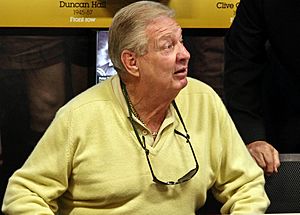Graeme Langlands facts for kids

Langlands in 2014
|
||||||||||||||||||||||||||||||||||||||||||||||||||||||||||||||||||||||||||||||
|
Personal information
|
||||||||||||||||||||||||||||||||||||||||||||||||||||||||||||||||||||||||||||||
|---|---|---|---|---|---|---|---|---|---|---|---|---|---|---|---|---|---|---|---|---|---|---|---|---|---|---|---|---|---|---|---|---|---|---|---|---|---|---|---|---|---|---|---|---|---|---|---|---|---|---|---|---|---|---|---|---|---|---|---|---|---|---|---|---|---|---|---|---|---|---|---|---|---|---|---|---|---|---|
| Full name | Graeme Frank Langlands | |||||||||||||||||||||||||||||||||||||||||||||||||||||||||||||||||||||||||||||
| Born | 2 September 1941 Wollongong, New South Wales, Australia |
|||||||||||||||||||||||||||||||||||||||||||||||||||||||||||||||||||||||||||||
| Died | 20 January 2018 (aged 76) Sutherland, New South Wales, Australia |
|||||||||||||||||||||||||||||||||||||||||||||||||||||||||||||||||||||||||||||
|
Playing information
|
||||||||||||||||||||||||||||||||||||||||||||||||||||||||||||||||||||||||||||||
| Height | 182 cm (6 ft 0 in) | |||||||||||||||||||||||||||||||||||||||||||||||||||||||||||||||||||||||||||||
| Weight | 12 st 4 lb (78 kg) | |||||||||||||||||||||||||||||||||||||||||||||||||||||||||||||||||||||||||||||
| Position | Fullback, Centre | |||||||||||||||||||||||||||||||||||||||||||||||||||||||||||||||||||||||||||||
|
||||||||||||||||||||||||||||||||||||||||||||||||||||||||||||||||||||||||||||||
|
Coaching information
|
||||||||||||||||||||||||||||||||||||||||||||||||||||||||||||||||||||||||||||||
|
||||||||||||||||||||||||||||||||||||||||||||||||||||||||||||||||||||||||||||||
Graeme Frank Langlands, known as "Changa", was a famous Australian rugby league player and coach. He was born on 2 September 1941 and passed away on 20 January 2018.
Langlands played for the St. George Dragons and was a key player in their amazing run of 11 straight championship wins. He also played a record 45 games for the Australian national team between 1963 and 1975. He was the captain of Australia in 15 of these important matches.
Contents
Early Life and Career Beginnings
Graeme Langlands was born in Wollongong, New South Wales, Australia, on 2 September 1941. He started playing rugby league at a young age.
By the time he was 18, Langlands was already playing in the top-level competition for the Wollongong Club. In 1962, he got his first big chance when he was chosen to play for the Country Firsts team. That same year, he began playing for New South Wales, representing his state a record 33 times over 14 seasons.
Playing for St. George and Australia
In 1963, Langlands joined the St. George Dragons along with another talented player, Billy Smith. They brought new energy to the Dragons team. Langlands first played as a centre, but later moved to fullback. He and Smith had a special connection on the field, understanding each other's moves perfectly.
Langlands made his first international appearance for Australia in 1963 as a centre against New Zealand. He was so good that he spent his first four years in international games playing at centre.
Historic Wins and Captaincy
In 1963, during the Kangaroo Tour in England, Langlands scored an amazing 20 points in a single game against Great Britain. This helped Australia win the Rugby League Ashes for the first time as a purely Australian team. From then on, Langlands played for Australia every year for 13 seasons.
He played in four Grand final winning teams for St. George, including the 1966 final where he kicked seven goals to help beat Balmain. He was the top point scorer in the competition in 1971 and 1973.
Langlands first became captain of Australia in 1970. He led the team for the next five years, also serving as Captain-Coach for the 1972 World Cup and the 1973 Kangaroo tour. In 1974, in his final Test match against Great Britain, he played an incredible game, scoring a try and kicking two goals to win the Ashes for Australia. After the game, the crowd cheered "Changa, Changa" as his teammates carried him off the field.
He last captained Australia in the undefeated 1975 World Cup campaign. He was the last player to be chosen as both captain and coach for the Kangaroos.
The "Greatest Try Never Scored"
During the 1972 World Cup final between Australia and Great Britain, Langlands was involved in a moment many call the "greatest try never scored." Australian player Dennis Ward kicked the ball high. Langlands jumped, caught the ball over the try line, and seemed to score a spectacular try. However, the French referee said Langlands was offside. Replays later showed he was actually onside and should have scored.
Playing Style and Famous Moments
Langlands was known for being a graceful and fast runner. His special sidestep, where he would fake going one way and then quickly leap the other, became famous. This move allowed him to break through defenses easily.
The White Boots Story
A well-known story in Australian rugby league is about Langlands and his white boots in the 1975 Grand Final. Before the game, he had an injury and received an injection that, instead of helping, made his leg numb.
Early in the game, it was clear something was wrong when his kicks went off target. The Dragons had planned to use long kicks, but with Langlands struggling, they couldn't. He also wore white football boots, which were very unusual at the time when everyone else wore black. This made his mistakes stand out even more. The Dragons lost the game 38-0. Langlands later said he regretted playing in the second half. This tough experience made him decide to play one more season in 1976 before finally retiring.
After His Playing Career
Langlands retired in 1976 at age 34, after playing 235 games for St. George. Even though his last season wasn't his best, he was still seen as one of the most respected players in the sport.
In his retirement year, he was given an award, the Member of the Order of the British Empire (MBE), for his contributions to rugby league.
In 1999, Langlands was named one of the "Immortals" of Australian Rugby League. This is a very special honor given to only a few legendary players.
In 2002, he was inducted into the Australian Rugby League Hall of Fame. In 2008, he was named one of Australia's "100 Greatest Players" and was also chosen for the "Team of the Century" as an interchange player. New South Wales also named him at centre in their team of the century.
In 2022, the St. George Dragons District Rugby League Club named Langlands at fullback in their own team of the century.
Later Years and Passing
Graeme Langlands passed away on 20 January 2018, at the age of 76, in Sydney. He had been receiving care for dementia and Alzheimer's disease.
Images for kids
 | Percy Lavon Julian |
 | Katherine Johnson |
 | George Washington Carver |
 | Annie Easley |


